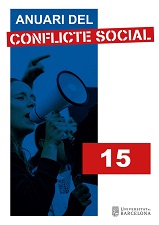Evolution of the monoculture forest production model in Arauco-Malleco over the last two decades
DOI:
https://doi.org/10.1344/ACS2024.15.7Keywords:
Land use, forest resources, forest conservation, MapucheAbstract
Abstract
This study examines the evolution of the monoculture forest production model in Arauco-Malleco over the past two decades and its potential impact on native forest area and agricultural land. Utilizing official data from the National Forest Corporation on “Land Use Change Monitoring,” variations in land cover were quantified and mapped at three distinct time points. The results reveal different patterns of change in the analyzed areas, influenced by territorial characteristics and the percentage of the resident Mapuche population. Overall, a sustained increase in hectares dedicated to forest plantations is observed in areas with a higher presence of Mapuche communities, which negatively affects the extent of native forest.
References
Agosto, P. y Briones, C. (2007). Luchas y resistencias mapuche por los bienes de la naturaleza. En OSAL (Buenos Aires: CLACSO) Año VIII, Nº 22, septiembre.
Calderón, M., Díaz, R., Morales, C., Mühle, A., Rodríguez, M., Rojas, R., ... & Villaseca, J. (2013). Territorios rurales y neoliberalismo en Chile: Conflictos económicos y sus expresiones políticas en zonas de vitivinícolas, forestales e industrias salmoneras. Cuadernos de antropología social, (38), 153-176.
Carrasco, N. (2012). Trayectoria de las relaciones entre empresas forestales y comunidades mapuche en Chile. Aportes para la reconstrucción etnográfica del desarrollo económico en contextos interétnicos. Polis. Revista Latinoamericana, (31).
Donoso, P., Romero, J., Reyes, R. y Mujica, R. (2015). Precedentes y efectos del neoliberalismo en el sector forestal chileno y transición hacia un nuevo modelo. En Pinol (Ed.) Democracia versus neoliberalismo. 25 años de neoliberalismo en Chile. LOM Ediciones.
Escalona, E., & Barton, J. (2021). ‘Oro verde’: la invención del paisaje forestal en Wallmapu/Araucanía, sur de Chile. Boletín de la Asociación de Geógrafos Españoles, (88).
FUCOA. Fundación de Comunicaciones, Capacitación y Cultura del Agro, . (2014). Mapuche. Serie introducción histórica y relatos de los pueblos originarios de Chile. Santiago.
Fuenzalida, M., & Arce, S. (2020). Experiencias de recuperación territorial a partir de resistencias al modelo de producción forestal. Anuario del Conflicto Social, (9).
Garfias, R., Castillo, M., ToRAL, M., Adasme, C., & Navarro, R. (2013). Determinación de la distribución actual y potencial de bosque nativo mediante análisis espacial en SIG. Estudio de caso: Tipo Forestal Roble-Raulí-Coigüe en Chile. Interciencia, 38(8), 577-584.
Gonzalez, M. (2015). ¿Agua para quién? Escasez hídrica y plantaciones forestales en la provincia de Arauco. Chile. Recuperado de http://www.mapuexpress.org
González-Hidalgo, M., & López-Dietz, S. (2020). Las múltiples y sistemáticas violencias asociadas al extractivismo forestal en Wallmapu. Anuario Del Conflicto Social, (9).
Henríquez Jaramillo, L. (2013). Cinco décadas de transformaciones en La Araucanía Rural. Polis. Revista Latinoamericana, (34).
Ipinza, R., Barros, S., De la Maza, C. L., Jofré, P., & González, J. (2021). Bosques y Biodiversidad. Ciencia & Investigación Forestal, 101-132.
Latorre, J. I., & Pedemonte, N. R. (2016). El conflicto forestal en territorio mapuche hoy. Ecología Política, 51, 84–87. http://www.jstor.org/stable/24894076
Martínez, V. (2006). El enfoque comunitario. El desafío de incorporar a la comunidad en las intervenciones sociales. Santiago: Universidad de Chile.
Miranda, A., Lara, A., Altamirano, A., Zamorano-Elgueta, C., Hernández, H. J., González, M. E., ... & Promis, Á. (2018). Monitoreo de la superficie de los bosques nativos de Chile: un desafío pendiente. Bosque (Valdivia), 39(2), 265-275.
Montalba, R., Vieli, L., Vallejos Romero, A., Zunino, H., & Vera, L. (2017). Determinación de las fuerzas conductoras de la transformación ambiental de la Araucanía chilena: El “paisaje cultural” como marco de análisis. Diálogo andino, (54), 51-61.
Painecura-Medina, L. (2022). Situaciones de dependencia económica informal en el trabajo forestal por cuenta propia de La Araucanía. Revista Austral de Ciencias Sociales, (43), 129-150.
Pineda, César Enrique. (2014). Mapuche resistiendo al capital y al Estado. El caso de la Coordinadora Arauco Malleco en Chile. Latinoamérica. Revista de estudios Latinoamericanos, (59), 99-128.
Rubilar, G. y Roldán, A. (2014). Áreas de Desarrollo Indígena: estudio de caso del ADI Puel Nahuelbuta, como estrategia de las políticas públicas en el mundo mapuche. Universum, vol.29, n.2, pp.253-276.
Torres-Salinas, R., García, G. A., Henríquez, N. C., Zambrano-Bigiarini, M., Costa, T., & Bolin, B. (2016). Desarrollo forestal, escasez hídrica, y la protesta social mapuche por la justicia ambiental en Chile. Ambiente & Sociedade, 19, 121-144.
Downloads
Published
How to Cite
Issue
Section
License
Copyright (c) 2024 Manuel Fuenzalida, Felipe Portales

This work is licensed under a Creative Commons Attribution 4.0 International License.
AUTHORS RETAIN COPYRIGHT. CREATIVE COMMONS
The authors who publish in this journal agree to the following terms:
- The authors retain the copyright and grant the journal the right of first publication of the work, which will be disseminated following the Creative Commons Attribution license.
- Authors are free to establish additional independent contractual agreements for the non-exclusive distribution of the version of the work published in the journal (such as publication in an institutional or thematic repository, their personal website or a book), provided have your initial publication in this journal recognized.
- Texts will be published under a Creative Commons Attribution License that allows others to share the work, provided they include an acknowledgement of the work’s authorship, its initial publication in this journal and the terms of the license.
- Self-archiving of pre-print and post-print versions is allowed.
Privacy statement
The email addresses and names entered in this publication will be used exclusively for the purposes declared and will not be used for any other urposes or made available to third parties.







